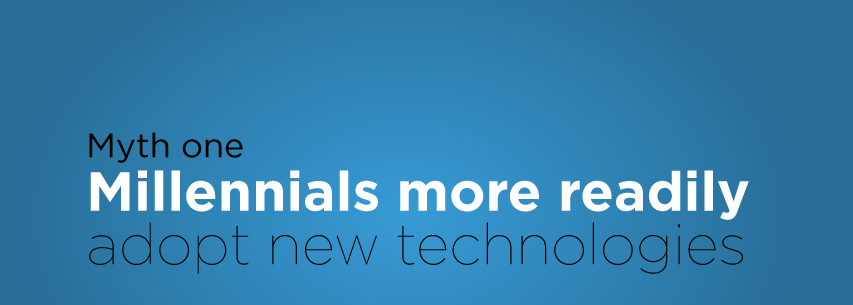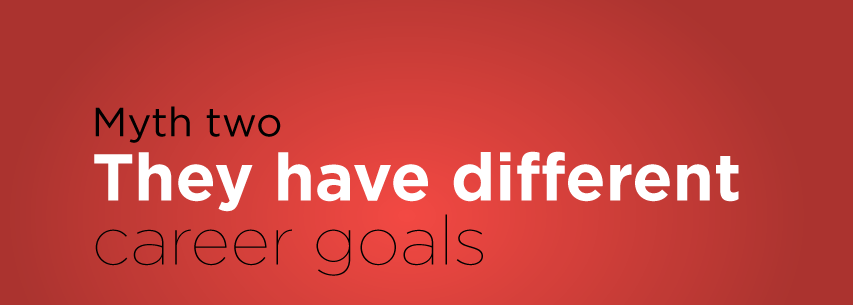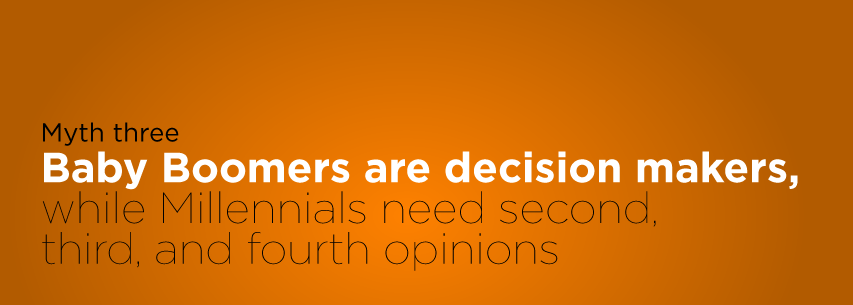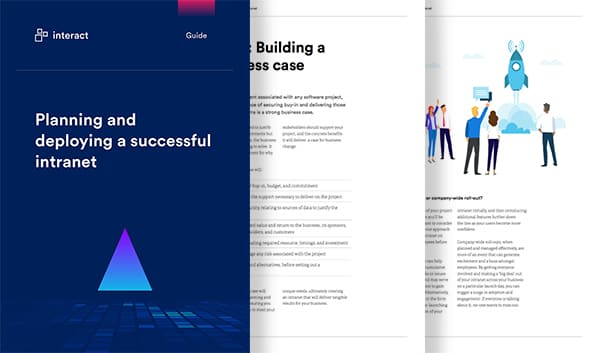Collaboration with Millennials and Baby Boomers: Debunking the 3 Biggest Myths
As of 2015, Millennials comprise over one third of the American workforce, making them the largest generation currently represented. In their curiosity and eagerness to understand their young counterparts, many older employees have generalized and made assumptions about the dispositions of Millennials and their habits at work. Of course, Millennials are a vast and diverse group, and such generalizations are often inaccurate. The fundamental differences Baby Boomers and Gen Xers see between themselves and Millennials sometimes sound eerily similar to stereotypes that were once lobbed at older generations by their parents’ generations. Do Millennials and Boomers really collaborate differently? Can they work side by side? Here are three of the biggest myths we’ve busted about collaboration between the two generations.

Millennials more readily adopt new technologies
“I don’t know,” you may be saying. “The older workers at my company really are more reluctant to use new technology.”
This may very well be the case! But correlation does not prove causation, and the reason for Millennials’ technological prowess may not be related to their age or even to the fact that they were raised around gadgets. The longer employees stay with a company, the more likely they are to become set in their ways. 68% of employees over the age of 35 disagree that organizational change is important, whereas 80% of younger workers believe it is. Young workers have to learn a new set of tools and skills into which digital technology fits nicely. The developments that are currently revolutionizing the workplace are just another set of tools that those new to the workforce must learn in order to do their jobs. While many Millennials have been using the internet and social media at least since their teenage years, the older end of the generation – those in their mid-30s – grew up in a time before the current digital proliferation, just like Generation Xers and Baby Boomers. Moreover, most Boomers now use computers in some capacity, and most working people are smart and capable enough to develop these skills if need be. It is more difficult to convince someone to learn a new tool, however, when they’ve been succeeding at their job for years without it.
The responsibility, then, falls on businesses to ensure cultural shifts are handled properly and training is provided to all employees to use new technologies. If all ages are equally capable of learning to use new tools, management must decide which ones will provide the most benefits and productivity gains to their teams and demonstrate this to those who will have to use them on a daily basis.

They have different career goals
Prevailing generational stereotypes include that Millennials only want to work “meaningful” jobs, while Baby Boomers are primarily concerned with career advancement. Millennials additionally have the reputation of switching jobs frequently. A recent IBM study found, however, that current economic conditions may be pushing Millennials to change employers more often and that the issue may also not be as widespread as it’s perceived to be. The study found that while 27% of Millennials have already worked for five or six different employers, 75% have been at their current job for three or more years. Of those Millennials who have recently changed jobs, 42% did so for reasons of career advancement or a better salary, matching Baby Boomers exactly. In fact, looking for meaningful work as a reason for changing careers came in third place for both Millennials and Baby Boomers.
When it comes to career goals, Millennials may be frustrated – 63 % feel their leadership skills aren’t being properly developed. While this is a troubling number, it does mean that those surveyed are looking to become strong leaders and rise to the occasion at work, just like previous generations. This paints a bright picture for the future, as long as those 63% get the training they desire.

Baby Boomers are decision makers, while Millennials need second, third, and fourth opinions
This myth may be related to the assumption that Millennials are more technologically savvy. After all, crowdsourcing has become a powerful trend online. So do Millennials crowdsource all of their decisions? It’s true that Millennials value collaboration. 88% attest to that, in fact. It’s also true that 56% of Millennials reported that they feel they make better decisions when a variety of people provide input. However, Baby Boomers were right behind them at 49%. In fact, Generation X feels the most strongly about the issue at 64%! Compared to them, Millennials and Boomers are practically identical when it comes to collaborative decision making.
In addition, approximately 12% of Millennials are the head of a department or division at their organization, and 7% are members of senior management or sit on a board of directors. This completely busts the myth that Millennials can’t make decisions since this generation is rapidly joining the ranks of decision makers and strategists in the workplace.
What does it all mean?
Ultimately, a lot of the differences between Baby Boomers and Millennials can likely be chalked up to level of experience. Millennials newest to the workforce, many having been out of college only a short time, and even the oldest of the generation have barely over a decade at work. Baby Boomers have been working for decades and have honed their habits and skills thoroughly. An important takeaway from IBM’s study, and others, is that Millennials are eager to learn, collaborate, and perform. As they grow in number within the workforce, older generations should be enthusiastic rather than apprehensive. Hard skills are developed over time, and in disposition, this generation is as capable as every one that came before it. Whatever small differences may exist, they ultimately are trivial, and Baby Boomers and Millennials can look forward to a fruitful partnership for years to come.
